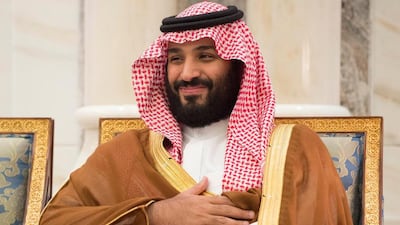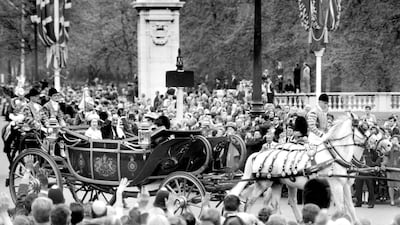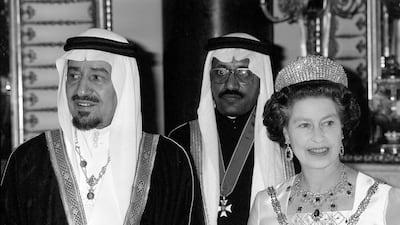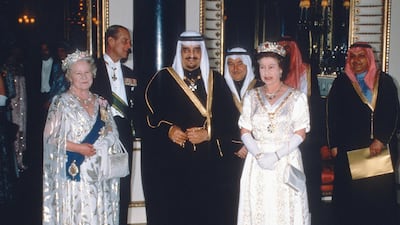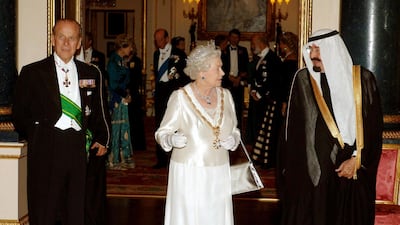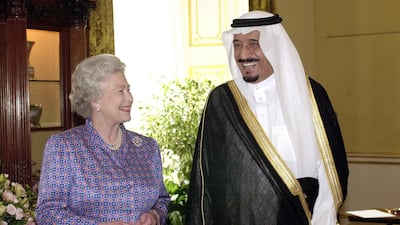Queen Elizabeth II will host a lunch for Saudi Crown Prince Mohammed bin Salman when he begins a visit to Britain today with an ambitious agenda to display Saudi Arabia’s Vision 2030.
Consolidating the ties between the British royals and the new generation of the house of Saud is a prime of objective for the trip.
A separate dinner has also been arranged with Prince Charles, the next in line to the throne, and Prince William.
There will be meetings with Prime Minister Theresa May at 10 Downing St and at Chequers, her country residence.
Prince Mohammed, 32, will also use the trip to deepen his knowledge of the workings of the UK government at a meeting of the British Cabinet and a session with the National Security Council.
Comment: Mohammed bin Salman's London visit marks a key moment in Saudi Arabia's transformation programme
He will seek to secure the confidence of the City of London, which has made a strong bid to list the kingdom’s national oil company, Saudi Aramco.
And religious leaders will also have a chance to meet the heir to the Saudi throne.
“He is a young man in a hurry and perhaps most important of all he is changing the political and economic culture of Saudi Arabia,” said Sir Sherard Cowper-Coles, who served as ambassador in Riyadh when Prince Mohammed was first making his mark a decade ago. “It’s a massive visit, it’s his first visit to the West since he became Crown Prince. Saudi Arabia matters.”
London has pitched an entirely new type of relationship with Saudi Arabia as the outcome of the visit. It hopes Britain can enable the architect of the reform programme to transform his nation into a player in the global economy.
At the heart of the three days of talks will be the launch of a bilateral government body designed to assist in the roll out of Vision 2030 and to promote British involvement in rapidly developing service sectors.
The Strategic Partnership Council would provide a platform government cooperation on the reform agenda as well as formalising the inter-governmental dialogue and overseeing the work of envoys appointed jointly to drive “economic and social progress”.
Previous Saudi Royal visits to London:
The two leaders will also discuss the conflict in Yemen. These talks will not only cover the humanitarian crisis and means of tackling the ballistic missile threat but also fresh efforts to achieve a political settlement between the factions.
With the headline figure of $100 billion circulating in London, the agreements and memorandum of understanding lined up for the visit play to the strengths of the British economy. Saudi Arabia has a growing need for service industries, education, technology and public sector contracting. The scope for British firms to invest in Saudi Arabia is likely to increase over the next decade as the reform plan opens up new opportunities, said one economist with insight into the official preparations.
The Gulf crisis will also feature in the working visit. The Qatar stand off has frustrated British hopes of sealing a quick free trade deal with the region after London breaks away from the European Union in March next year. Mr Al Jubeir said Saudi Arabia remains committed to a trade deal with Britain, which he said would be easier that striking an accord with the 27-member European Union. “Our countries have been allies for many, many years,” he said. “We think that Britain is one of the great powers.
________________
Saudi Crown Prince tour
Mohammed bin Salman begins Egypt visit with focus on regional issues
Saudi crown prince tours Suez Canal zone on second day of Egypt visit
Editorial: Touring Mohammed bin Salman eyes partners for change
________________
"British ingenuity and British technology and British know-how is not going to change whether you're part of the EU or not part of the EU."
The regional crisis has other manifestations as Qatar grants support for protests during the visit, turning out what Mr Al Jubeir described as “rent-a-crowd” demonstrators for planned protests at key sites in central London.
A coalition of activists and campaign groups has vowed to mount protests surrounding the visit. Mr Al Jubeir has said the Saudi Arabian leadership is well aware that demonstrations are a big part of British life. Far from the backdrop to the visit, protests are an aspect of a “very strong and very close political relationship”. These should not crowd out the main focus of the trip. “This is part of your traditions, there are protests that take place in London all the time,” he said. “This is not going to affect the visit or the objective of the visit.”
The conflict in Yemen had been distorted into a one-sided view of the wealthiest Arab country attacking the poorest. Mr Al Jubeir said Riyadh would continue to make its case that this was a war his country had to fight.
“They criticise us for a war in Yemen that is a just war, they don’t see the Houthi’s laying siege to towns and villages, the convoys of humanitarian assistance that was stolen throughout 2017, the laying of mines that harm civilians. And don’t forget the Houthis are the ones that walked away from the talks.”
After leaving London, Prince Mohammed will travel on to other Western states, mostly notably to France and longer trip to the US, including Washington.
The wider interest of the world in Prince Mohammed’s changes is to ensure that one fundamental move he has made pays off in the long-run. “Young Saudis, the 30 per cent of the population under 35, are doing real work,” said Sir Sherard. “That is the future. If we want to help him change Saudi Arabia, change the region for the better, then there is no alternative to engagement.”
